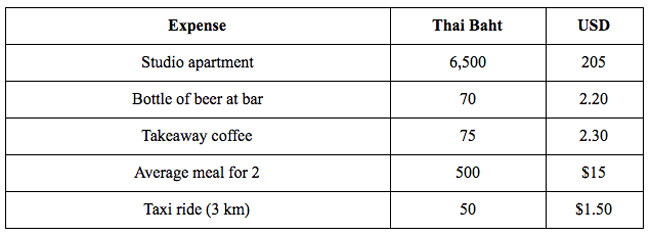Have you ever dreamed of earning money while actually enjoying life and having some freedom to explore and travel?
Teaching in Thailand won't make you rich but it will bring you some happiness and a very different life experience than the one you're currently living.
It really is a viable way to jack in your job, up sticks, and move to another country to try a different side of life.
In this teaching guide, I'll provide you with all the information you need to plan your transition to an international teacher.
From requirements and qualifications to visa and work permit rules, TEFL course options, job opportunities, and living costs, I've got you covered.
Grab a coffee and bookmark this guide for later. You'll need it!
Contents:
- Requirements
- Visa
- Work permit
- Teaching license
- Jobs
- Locations
- Salary
- Job Benefits
- Cost of living
- Arrival checklist
- FAQ
- Final Word

Teaching in Thailand is very rewarding.
Requirements for Teaching in Thailand
Almost everyone with a good grasp of the English language can land a teaching job in Thailand, but it’s fair to say that native speakers have it relatively easier.
Let’s take a look at the requirements to find work and start teaching.
1. A Degree
A degree can help you get a teaching job in Thailand.
It may be a requirement for some state schools in cities such as Bangkok, and you will certainly need one if you want to teach at international schools.
That being said, there are plenty of jobs that do not require a degree.
There are plenty of teaching jobs to be found through agencies and in rural government schools where only a TEFL, which will get on to later, is required.
So a degree is helpful but not essential. However, it is essential that you have TEFL certification.
Additionally, it doesn’t matter what subject you have a degree in. Whether it’s in architecture, music, or animation, you have the green light to teach.
In a nutshell, as long as you have a strong grasp of the English language, a TEFL, and the proper documents in place, you will get a job.
2. A TEFL Certificate
Also known as TESOL (Teachers of English to Speakers of Other Languages), a TEFL (Teaching English as a Foreign Language) certificate is essential before you look for a teaching job.
This not only goes for Thailand but every other country where English is not an official language.
Although not a legal requirement, many, if not all, schools will ask for a TEFL certificate.
TEFL doesn’t refer to a single certifying body or organization; it is simply the training you need to understand the fundamentals of teaching.
It is extremely helpful for those with no prior teaching experience.
Courses
There are many companies offering TEFL courses, some of which can be taken online.
So whether you’re in the US, CA, UK, Europe, or Australia, you can study a course.
If you’re in Thailand or want to take your course in Thailand (I recommend that), you can also choose from a number of companies.
Taking your TEFL in Thailand enables you to learn more about the educational system and culture of the country.
It gives you on the ground experience, which will be invaluable when you start teaching. It is also super cheap to live in Thailand why you study, so why not take that opportunity?
The two best in-person TEFL courses in Thailand are by SEE TEFL and TEFL Heaven.
If you want to do a course online, check out i-to-i or TEFL Academy.
I have a full article on TEFL courses here, which you can read later.
The large majority of people can take a TEFL certificate without a degree or being a native English speaker.
There are 3 basic requirements:
- You are interested in learning and teaching.
- You have at least a C1 or Advanced English level. If this is unknown, a written task and interview process will measure your level.
- Be 18+ years of age.

Teaching in rural Thailand will give you real insight to Thai culture and tradition.
Getting a Visa to Teach in Thailand
Your visa circumstances will vary depending on your situation.
1. You already have a job offer in place
If you already have a teaching job lined up in Thailand, you will get a Non-Immigrant B visa from the Thai embassy in your home country. Your employer will give you the letter you need to obtain this
2. You are coming here to study a TEFL
Some people study a TEFL on a tourist visa, but the official way is by getting a Non Immigrant Education visa.
A school like SEE TEFL operates under a Ministry of Education school license with permission to run TEFL programs and can provide documentation in support of an ED Visa application. Note that this can take up to 4 weeks to process.
3. You already have a TEFL certificate but haven't secured a job
You would enter on a tourist visa.
—–
Whatever your situation, everyone who teaches in Thailand needs a work permit. And the route to getting a work permit is via a Non-Immigrant B visa.
When you get to Thailand, your employer will apply for your work permit on your behalf (usually), on the basis that you have this visa.
If you don't have a job lined up in Thailand then you will enter on a tourist visa.
When you find a job, you will go to a neighboring country such as Laos and visit the Thai embassy there to obtain your Non-Immigrant B visa.
You will then return to Thailand and your employer will sort out the work permit for you to begin teaching.
Visa Requirements
Non-Immigrant B
The Non-Immigrant B visa has a 90-day validity from your date of entry and is issued to foreign nationals going to work in Thailand.
This visa is required for an employer to process your work permit.
Once you get your work permit, you can extend your stay in the country for as long as the duration of your employment contract.
You can apply for this visa at any Thai embassy or consulate. The visa fee varies depending on where you apply for it and the processing time is generally two days.
If you have already secured a job before flying to Thailand, you can obtain the necessary documents from your employer and, along with the other requirements, apply for this visa at your local Thai consulate or embassy.
Below are the requirements for application:
- Passport or travel document with at least 6 months validity
- Completed visa application form
- Recent (4 x 6 cm.) photo with white or blue background
- Letter of acceptance from employing institute or school in Thailand
- Letter of approval from government agencies
- Evidence of educational qualification
- School license or business registration, list of shareholders and school profile
- Resume
- Optional – Police certificate or letter from authorized agencies verifying that you have no criminal record
- Additional documents as requested by consular officers
Tourist Visa
With a single entry tourist visa, you’re given 60 days to stay in the country.
You have the option to extend the validity to 30 days for a fee of 1,900 Baht at an immigration office.
If you already have a TEFL certificate and want to try your luck searching for a job in Thailand, it is best to arrive on a tourist visa because it gives you two months to find a job.
Once you accept a job and obtain sponsorship from your employer, you can hop over the border to a neighboring country and apply for your B visa.
A tourist visa is easily obtained from your local Thai embassy.
Dependent Visa (if you have a child or other family member)
Just recently I had a comment on the blog from a lady who had accepted a teaching position in Thailand but wondered how she would be able to bring her daughter with her to stay in Thailand.
If you plan to migrate to Thailand with your child or other member of your family, you can apply for a dependent visa.
This falls under the Non-Immigrant O Visa category.
You can sponsor your children, spouse, and parents if you meet any of the following:
- You’re a holder of a Non-Immigrant B visa and have Work Permit.
- You’re a holder of a Non-Immigrant O visa and have Work Permit to be employed in a charity or foundation.
- You’re a holder of a retirement visa and your dependents are under 50 years old.
Below are the requirements your dependents are required to submit to apply for a dependent visa application:
- Passport or travel document with at least 6 months validity
- Completed visa application form
- Recent (4 x 6 cm.) photo with white or blue background
- For spouse, original and copy of Marriage Certificate
- For children, original and copy of Birth Certificate
- Copy of your Thai Work permit
- Copy of your passport Info page and Thai Visa page
- Visa fee (varies depending on the Thai consulate or embassy)
- Additional documents as requested by consular officers
Getting a Work Permit
As discussed previously, to work legally in Thailand, you need to have a work permit.
To obtain one, you first need to secure a teaching job and have your B visa and other documents (as discussed above) in place.
Once everything is in place, your employer should handle your work permit application for you. You will need to attend the labor office, but under the direction of your employer it should all be quite straightforward.
Once you have your work permit you can begin teaching.
The last thing to bear in mind is that when you work as a teacher, you will have to report to immigration every 90 days. This is basically just a check-up on your whereabouts and person. It is nothing to worry about.
This is a requirement for everyone on a type of visa that allows them to stay in the country on a long-term basis.
Sure, it is a bit of a hassle, but if you go early and get yourself to immigration before 10 am, you should have it done fairly quickly.
Getting a Teaching License
A teaching license is something that not many people are aware of.
Whether you need one actually depends on the school and how long you have been teaching.
The license is issued by the TCT (Teachers Council of Thailand), a board of professionals responsible for setting and implementing teaching standards and ethics of teachers and educators.
One thing is certain: if you’re a new teacher, you don’t need to have a TCT license immediately. Instead, a provisional teaching permit is put in place.
As soon as you’ve been hired, the school will apply for a provisional teaching permit on your behalf.
The said permit is granted for two years, which allows the school a grace period for you to meet the TCT requirements for a license.
Teachers can acquire two provisional teaching permits before they are mandated to get a permanent teaching license.

The familiar cute Thai pose.
Teaching Jobs in Thailand
Now we have got the boring visa stuff out the way, let's get on to the type of teaching work you can expect to undertake:
1. Government Schools
A government school is a public school funded by the state.
As in many other countries, a teaching job in a government school is the most stable job a teacher can have.
In order to get into a government school as an English teacher, you need to have your TEFL certificate in place.
If you want to go in at a grassroots level and experience what it is like in the state education system in Thailand, this is for you. The teaching day is 8-4pm, Monday to Friday.
Note that many agencies exist for placing both non and native English speakers at government schools.
2. International Schools
With higher pay come stricter rules.
Compared to other schools, international schools have a more rigid set of rules and requirements for teachers.
This typically includes a degree in a particular subject for which the job is advertised, and usually some experience teaching this subject in your home country.
Some may also require a teacher training certification.
3. Private Tutoring and Training Agencies
Aside from schools, there are also many private agencies that offer tutoring and training services to students.
These agencies generally hire native English speakers.
Pay is usually by the hour and, while you can get a full-time job with such companies, they can be an excellent source of additional income for teachers who are teaching at state schools.
4. Private Tutoring
Many teachers in Thailand supplement their income through private tuition.
As a foreign English teacher you can expect to charge between 300 and 600 Baht per hour, depending on the location.
Of course, teaching in rural Thailand attracts a lower salary compared with the cities such as Bangkok and Chang Mai.
That said, living in Bangkok is more expensive.

Private tutoring can top up your salary.
Best Places to Teach in Thailand
With its vast scope and unique culture, Thailand has a lot to offer to those who want to explore the country and work as an English teacher at the same time.
Aside from the beauty of the country, it is also very close to other Southeast Asian countries such as Malaysia, Singapore, Vietnam, Cambodia, and Laos, allowing you to travel conveniently.
From stunning beaches to serene countryside to bustling cities, you have a lot of options.
Here are some of the most common places where the demand for English teachers is high.
1. Bangkok
Home to extravagant hotels, endless nightlife, thousands of restaurants and cafes, and lots of traffic, Bangkok is not for those who want a quiet life.
If, on the other hand, you’re the type who loves the bright lights and stimulation of a big city, you’ll certainly love staying and working here.
One thing’s for sure: you’ll never run out of things to do in Bangkok.
The capital is home to thousands of expats, so if you’re a first-time teacher, you might want to consider Bangkok as your first home.
The city is modern and caters for people from the world over, so you’re likely to have a more comfortable adjustment period.
2. Chiang Mai
Located in the northern part of the country, Chiang Mai is a small but popular city.
It is known as the cultural centre of Northern Thailand and popular for its trekking, forestry, ethnic groups, elephants, and temples.
Unlike Bangkok, life in this city is slower and quieter, but the expat community is great.
Chang Mai has developed a reputation for being a healthy lifestyle hub.
There is plenty going on in terms of yoga and Thai cooking classes, cycling, plant-based food joints and meet-ups. There's also some good live music to be found in Chiang Mai.
One thing that's very noticeable in Chang Mai is how Thais and foreign nationals coexist very well together. Not that they don't elsewhere, but there seems to be a real harmony here.
3. Phuket
If Chiang Mai is for elephants, Phuket is for beaches!
The island is famous for its white beaches and crystal clear waters, but in reality it's more like a big city surrounded by beach areas than a typical island.
Nightlife is a big part of life in Patong (the center) and clubs and bars are aplenty. Though there are quieter areas of the island.
Life in Phuket feels like a mixture of city and island life, depending on where you are on the island. Schools here are keen on hiring English speakers, so you might find your first job here in no time.
Keep in mind though that the cost of living in Phuket is a bit higher compared to other places in the country. Consequently, salaries are also (usually) higher.
4. Other Islands
There are many islands to choose from for a teaching job. In fact, you'll find teaching jobs all over Thailand.
Some of the most popular that offer significant opportunities for those seeking an English teaching job include Koh Tao, Koh Phi Phi, Koh Phangan, Koh Samui, and Koh Lanta.
Island life is definitely a life worth having – away from city stress and offering a healthier, slower pace.
5. Rural areas: Northeast (Isaan), North, Deep South
Aside from the cities and touristy islands, much of Thailand is very rural.
In many areas there are no beaches and minimal nightlife. You'll find mostly farmland and small towns that mirror each other, each connected by long, straight highways that seemingly never end.
There is a small but consistent demand for foreign English teachers in schools in rural areas, so if you’re aiming to teach in a place that can give you serenity away from the bustle of the city, consider the village life.
The most popular rural teaching region is probably Isaan, located in the north-eastern part of the country, where you will find smaller cities such as Korat, Khon Kaen, Udon Thani, Kalasin, and Ubon Thani, all of which have teaching opportunities.

You'll become pretty attached to your students.
Salary Expectations
The salary for TEFL jobs varies due to many factors, including location, the type of school, and your experience.
Since the cost of living in the capital and on the islands is relatively high, you can expect higher salary offers.
The large majority of people start on around 30,000 Baht in their first teaching job.
As you gain more experience, you can demand a higher salary because you'll be in higher demand.
There’s also a significant variation in salaries of teachers working in different types of school.
Check out the table below for a quick comparison on starting salary ranges for TEFL grade teachers.

Note that international school salaries very much depend on your experience and qualifications, and on the reputation of the school.
Some pay 70,000 to 120,000 Baht per month, and the very best ones (ISB, NIST and BPS, etc.,) pay well over 150,000 for qualified, experienced teachers.
Job Benefits
Health Insurance
If you land a teaching job in Thailand, it’s common for the school to provide health insurance.
However, you shouldn’t get too excited when they do, as it will most likely be basic coverage.
If health insurance is not a part of your benefits package, you’ll typically pay for it via salary deduction or be eligible to acquire medical help from public hospitals.
Many foreign teachers opt to purchase long stay travel insurance to cover them, particularly if they teaching for just a year.
You can also purchase medical cover locally as part of a bank account or through an insurance company.
If you're quite young, then I'm sure your family are quite worried about you going to teach abroad, and therefore they may want to get you a comprehensive health insurance policy.
Check out this page here for more details.
Housing Allowance
In Thailand, the provision of housing allowance depends on the type of school you’re employed in.
If you work for an international school, there’s a high chance of getting free accommodation or housing allowance that’s non-taxable.
Government schools, on the other hand, don’t usually provide this to teachers.
That said, some do offer an allowance. It won't be much, perhaps 1-3,000 Baht a month. Still, in some areas of Thailand you can get a nice little studio flat for less than 5,000 Baht per month.
Ask about this at your interview.
Food
Thailand is known for its mouth-watering cuisine, and most schools in Thailand provide foreign teachers with free lunch. But don’t expect this to be gourmet; it'll be a basic rice or noodle dish.
Don't worry if a free meal isn't thrown in, as you can have a large local meal at a very cheap price.
Other Benefits
Just like local workers, there are many other benefits that foreign teachers are entitled to.
- Sick leave: Employers are mandated by Thai law to provide annual sick leave to employees. The number of days varies from school to school, but typically it should be at least 10 days. A doctor’s note or medical certificate is required if you were absent for three consecutive days.
- Maternity leave: Schools in Thailand are mandated to give new mothers leave for 90 days, with 45 of that being paid.
- Vacation leave: Foreign teachers are entitled to the 13 Thai national holidays and an extra 6 days vacation after you've worked for 1 year. In reality, though, many English teachers in Thailand get the aforementioned plus an additional 6-8 weeks vacation.
There are also benefits that don’t apply to foreign teachers, and two of these are retirement benefits and social security.
If you plan on staying in Thailand long-term, you should have your own plan to save for your retirement. The general retirement age for teachers is 60, though many foreign teachers teach past 65.
Teaching Bonuses
Depending on your performance as a teacher, you may receive a bonus. Some schools also offer an enrollment bonus as an incentive to join.
It is also common for schools to offer a bonus when you sign a new contract and agree to continue your employment.

Cost of Living Basics
Aside from the beauty and charm of Thailand, many choose to teach here because of its affordability.
The table below lists some of the common expenses in Bangkok. If you’re looking to work in rural areas, you can expect a significant decrease on the listed amounts.
Of course, as is always the case with cost-of-living expenses, it depends on your expected standard of living.
Some people eat a lot less than others. Some people like to buy organic foods.
Some people don't drink alcohol or go clubbing, and some people would rather walk than take a taxi.
Some people think Starbucks is a waste of money, whereas others have to have it every day.
The cost of living really does depend on how you live and how frugal you are.

For a more detailed living expenses guide, visit this page.
Checklist: Arriving in Thailand
We are coming to end of this teaching in Thailand guide, so I thought it would be a good idea to include a quick summary of what to expect when you do arrive in Thailand, which also serves as a reminder of what you should have in place:
- Enter Thailand with your Non Immigrant B visa / Tourist visa. If you have a dependent with you, then they need to enter with their relevant visa too.
- If you are arriving in Thailand to take a TEFL course, then you will have most likely sorted out your accommodation through the company. If you haven't, it is a good idea to book into a hotel for a few days and then search the locality for an apartment to rent for the duration of your course.
- Similarly, if you have secured a job already and know the area in which you will be living, again it would be a good idea to check into a hotel for a few days while you do an apartment search. Long-stay accommodation can always be secured cheaper in Thailand than it can online through a rental agent.
- If you don’t have a TEFL certificate yet, now’s a good time to enroll and get one. See here.
- Look and apply for teaching jobs. See my job board for opportunities.
- Once you land a job, you will need to leave Thailand to apply for your B visa at a Thai embassy outside of Thailand. One of the documents you'll need is a sponsorship letter from your employer.
- Once you’ve obtained the Non-Immigrant visa, you can return to Thailand and provide a copy of your passport to your employer for the processing of your work permit.
Teaching in Thailand FAQ:
I thought I would finish with a quick-fire FAQ, covering the most commonly asked questions:
Here are some of the commonly asked questions regarding TEFL in Thailand.
1. Can I teach without a degree?
Answer: Some schools prefer individuals with a diploma/degree, but there are hundreds of foreign teachers teaching in Thailand without a degree.
Most get their job through an agency, as a workaround.
As long as you have your TEFL certificate, and you are presentable, then you will have a very good chance of getting a job very quickly.
+ More on teaching without a degree here.
2. Can I teach without a work permit or visa?
Answer: Technically speaking, you can’t work unless you have a work permit.
In reality though, schools delay the process of obtaining such because they want to make sure you’re a fit for the job.
A maximum of three months probation (teaching without a work permit) can be expected as long as the school can provide proof that your work permit is in process.
3. Can I still get a job if I’m a non-native English speaker?
Answer: Many schools in Thailand want native English speakers, but there’s a plenty bunch that also accept non-native speakers. However, the salary offered may be lower.
My advice is to get your TEFL and indeed an IELTS certification if you can, and prove your competence in speaking English. A degree will also help.
4. What is the age limit for teaching in Thailand?
Answer: Generally, there is no age limit for those who want to teach in Thailand.
Although the retirement age for Thai nationals is 60, you can still land a job even in your senior years as long as you’re deemed qualified by the school.
There are plenty of teachers teaching in their 50s and 60s. That said there is some age discrimination in Thailand and you may come across that in your search for a job.
I wrote about being an older teacher here.
5. Do I need to provide a background check to teach in Thailand?
Answer: The Thai Ministry of Education requires foreign English teachers to have a criminal background check (CBC).
However, in reality, the need for such depends on certain factors such as the school's requirements, your physical appearance (yes, in Thailand, you’ll be judged based on how you look pretty often), and the immigration officer that processes your visa after you have accepted a job.
To be sure, and to avoid any hassle, get a CBC in your own country before flying to Thailand.
6. Question: How many hours will I work per week?
Answer: Many foreign teachers in Thailand work for just 20 to 30 hours a week, leaving them with plenty of spare time.
Some schools, on the other hand, require their teachers to be within the school premises during school hours, which is usually seven to eight hours a day.
You can pretty much guarantee you'll be done by 4 o'clock though, which leaves some spare time for some private tutoring, or simply chilling out!
7. How easy is it to get work?
Answer: The demand for qualified English teachers is at an all-time high in Thailand.
If you’re a native speaker with a TEFL certificate, you’ll find yourself teaching in no time.
If you're not a native English speaker, as long as you’re confident in your English ability, there are still many jobs available.
8. Should I get a TEFL?
Answer: Technically, a TEFL certificate is not required by Thai law. However, the large majority of schools expect to see one, particularly for those who do not have a degree.
Furthermore, a TEFL certificate can increase your chance of getting a job, especially if you have no teaching experience, as it indicates that you have a decent grasp of the fundamentals of teaching English as a foreign language.
Need a TEFL certificate?
+ Click here to find the best course for you
Some Final Thoughts
Unfortunately, many of us are stuck in jobs we don’t really want to do for the mere reason that we need to pay our bills to ensure we have a roof over our heads and food on the table.
Teaching in Thailand provides an alternative to that life. And it's not just for the few either.
It doesn't have to be a permanent move. It could be a plan for a year or two.
Perhaps you've just had enough of looking out of the same window from the same office, or perhaps you haven't got a job at the moment and you're just looking for something inspiring to do with your life.
The thing I've learned about teaching English abroad is that it opens up many opportunities.
Many of the people I know who started out teaching in Thailand have gone on to teach back home or in another country.
Or they have been offered an opportunity in a different industry in a company in Thailand, or have simply stayed in teaching in Thailand because they love it.
The thing about life is that you have to take a chance, you have to put one foot in front of the other to make things happen
There will always be people telling you about the potential negative things that could happen.
But in my experience, after 13 years of living in Thailand, those same people are still back home doing the same job, moaning about the same politics, complaining about the same partner, and the same rainy days.
I'll tell you straight off the bat that teaching in Thailand won't make you a millionaire, but what I can tell you is that it will open the door to a new life with a bunch of experiences you'll never forget.
You will look back on your time with fond memories and be very pleased that you did it.
Go get 'em, champ!
Last Updated on



SB says
Mar 11, 2025 at 12:44 pm
TheThailandLife says
Mar 11, 2025 at 6:45 pm
Antonio says
I should have an interview with a Thai college next week, that's what they told me, It is for a position of Economics lecturer..
Being a bachelor's and master's degrees in Economics , International Markets and Management holder, other than a Us High School diploma achieved as a foreign exchange student in North Carolina..I have a couple questions..
I don't have a Tefl certificate at present time, do you think I can say to college staff that I can take it up before school begins directly in Thailand?, or shall I tell them that I can take it up with an on line course with a Us public school before going to Thailand? Here I could have a Celta course certificate..Four agencies in Bangkok accepted me already to teach English, but college teaching would be much better as to economic treatment and it would mean teaching what I studied over college years in Italy and this would be the best.
Also, do you think salary is some way negotiable?
It would be great if I took this opportunity..let's see how this develops..
Dec 27, 2021 at 12:56 am
Grain says
Thank you for the informations. I have quick questions:
1- Will schools give me work permit while I'm in probationary period? If they won't, what do I need to stay in Thailand without work permit while I'm in probationary period?
2- As a newly graduated English teacher, can I get a teacher licence with no teaching experience or do I have to work in my country first before coming to Thailand? Requirements on this website confused me: http://site.ksp.or.th/about.php?site=englishsite&SiteMenuID=4616
"3. Have continuing experience in teaching of not less than 1 year"
Thank you in advance.
Dec 17, 2021 at 7:24 am
Grain says
Dec 25, 2021 at 9:53 pm
TheThailandLife says
Dec 28, 2021 at 8:02 pm
Grain says
Thank you again and happy new year!
Dec 28, 2021 at 9:43 pm
TheThailandLife says
Dec 28, 2021 at 10:00 pm
Peter McConnell says
I have a degree in biochemistry, a degree in nursing, a post-graduate diploma in nursing, and I now work in IT.
I'm just wondering about the opportunities for specialised teaching, which I'd envisage being older students needing to become more proficient in the scientific/medical aspects of English.
Google will be my friend, but if you have any experience of the above, or any good resources, I'd be obliged if you could help.
Cheers
Pete
P.S. I've been to Thailand many times.
Nov 25, 2021 at 5:42 pm
TheThailandLife says
Nov 25, 2021 at 6:11 pm
Antonio Schiatti says
Thank you in Advance!
Jul 01, 2021 at 12:27 am
TheThailandLife says
Jul 01, 2021 at 12:59 am
Antonio Schiatti says
Jul 03, 2021 at 3:34 am
TheThailandLife says
Jul 03, 2021 at 5:58 am
Antonio Schiatti says
Jul 04, 2021 at 1:19 am
Gokul says
May 06, 2020 at 9:33 pm
Claire says
Question...if I enter Thailand with a B visa obtained with a letter of sponsorship from School X in Bangkok...am I then 'stuck' to that job and school? What happens if I want to change my job, can I then transfer the work permit or do I need to exit Thailand and start from scratch with new employer?
Thanks,
Claire
May 05, 2020 at 7:44 pm
TheThailandLife says
May 05, 2020 at 7:50 pm
Henry Striplin says
Oct 26, 2019 at 4:49 pm
Tom says
Jul 06, 2018 at 12:27 pm
TheThailandLife says
Jul 06, 2018 at 3:41 pm
John says
Jun 01, 2018 at 7:24 am
TheThailandLife says
Jun 01, 2018 at 8:53 pm